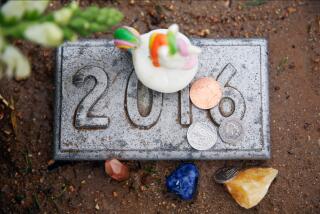Life in the 21st Century: More Suicides Among Elderly
- Share via
NEW YORK — A futurist taking a look into the 21st Century believes suicides among the elderly will be up, internal family violence will increase, and living patterns, life patterns and life styles are in for rapid change.
Details are between the covers of a report from Family Service America, the umbrella group for the estimated 275 nonprofit family service agencies in the United States and Canada.
The report was written by R. Morton Darrow, head of Darrow Associates, a think tank for managers of business, government, higher education and nonprofit groups.
The Grimmer Side
Among the more grim forecasts for the turn of the century:
--Suicide rates among the elderly will rise as social support systems are withdrawn.
--Baby-boomers will trigger a new round of inflation that could surge to 20%.
--Violence within the family will increase, as will intervention by other institutions and agencies.
Darrow says shifting values, the same ones energizing institutional changes throughout society, will be behind changed family life shapes.
For springboard purposes, the report starts out by lumping Americans into three value groups: Traditional, New Wave and Changers.
“The traditional group--subscribing to acceptance of authority, belief in hard work, acquisition of material things, respect for form and custom--can be expected to grow slightly over the next decade to around 30%,” the report says.
New Wave Growth
“The New Wave people--choosing individualism over authority, experience over things, quality over quantity, self-fulfillment over long-term gratification--will also grow slightly to around 25%.
“Both groups will draw their growth from the ranks of the Changers, who will drop to around 40%.
“Changers are presently half the adult population, moving around a mixture of Traditional, New Wave and intermediate positions as they shift over specific issues.”
The family, the social institution most resistant to change in the past, has been forced to adapt many of these shifts in values, the report says, noting that the adaptive process will accelerate over the next 20 years.
By the year 2000, for example, there will be a drop in the percent of Americans who marry. Presently it is more than 90%. By the turn of the century it may dip to 85%.
Greater Sexual Freedom
Also expected: more cohabitation, single-person households, unwed single-parent families and homosexual couples. This greater sexual freedom will occur against a backdrop of weakened religious, social and legal taboos.
Over the next few years there also will be widespread recognition of a family as “consisting of two or more people joined together by bonds of sharing and intimacy.” This will occur despite objections from Traditionalists.
Single-person households will continue to grow, pushed up by young people living alone, people separated or divorced, and surviving spouses of a marriage.
The report claims in the future family life probably will be strengthened as the result of:
--More corporations adopting policies aimed at supporting the family. Parental leaves and child care allowances for working mothers, for example.
--New approaches to breaking families out of the poverty trap.
--Growth of entrepreneurial home-based economic activities. Working at home.
More to Read
Sign up for Essential California
The most important California stories and recommendations in your inbox every morning.
You may occasionally receive promotional content from the Los Angeles Times.













